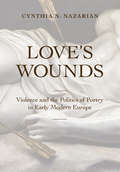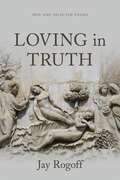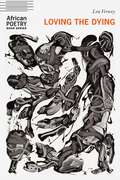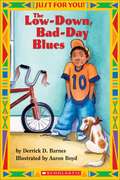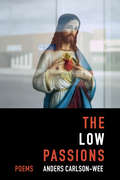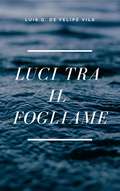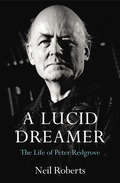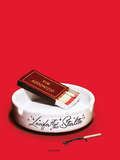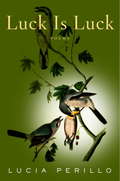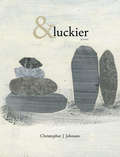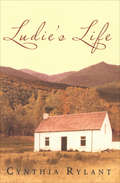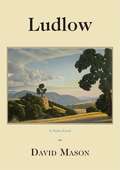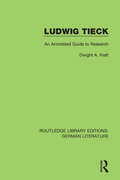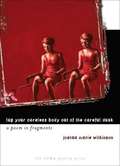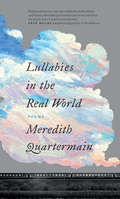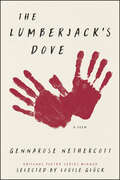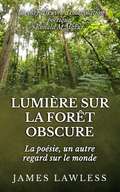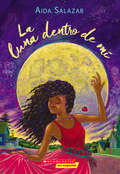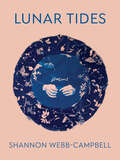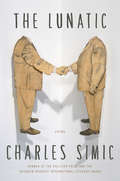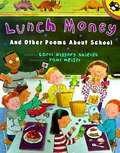- Table View
- List View
Love's Wounds: Violence and the Politics of Poetry in Early Modern Europe
by Cynthia N. NazarianLove's Wounds takes an in-depth look at the widespread language of violence and abjection in early modern European love poetry. Beginning in fourteenth-century Italy, this book shows how Petrarch established a pattern of inequality between suffering poet and exalted Beloved rooted in political parrhēsia. Sixteenth- and early seventeenth-century French and English poets reshaped his model into an idiom of extravagant brutality coded to their own historical circumstances. Cynthia N. Nazarian argues that these poets exaggerated the posture of the downtrodden lover, adapting the rhetoric of powerless desire to forge a new "countersovereignty" from within the heart of vulnerability—a potentially revolutionary position through which to challenge cultural, religious, and political authority. Creating a secular equivalent to the martyr, early modern sonneteers crafted a voice that was both critical and unstoppable because it suffered.Love’s Wounds tracks the development of the countersovereign voice from Francesco Petrarca to Maurice Scève, Joachim du Bellay, Théodore-Agrippa d’Aubigné, Edmund Spenser, and William Shakespeare. Through interdisciplinary and transnational analyses, Nazarian reads early modern sonnets as sites of contestation and collaboration and rewrites the relationship between early modern literary forms.
Lovetalk: How to Say What You Mean to Someone You Love
by Lois Wyse[from inside flaps] "In a world where love is used and abused, Lovetalk explores the love we feel but fail to express. Instead of explaining our deepest feelings with, "Oh, you know what I mean," Lovetalk proposes that we say what we mean. This is more than a how-to book; it's a why-not book as well. Why not help your love fulfill its prophecy of hope? Why not discover your strengths and weaknesses, and use them as tools in building a world of Us, instead of a world of you or me? Most of all, Lovetalk asks: Why not live a loving life. Let Lovetalk blaze the trail, and teach you to talk to your needs and fears in order to love in a totally new, totally free way."
Loving in Truth: New and Selected Poems
by Jay RogoffDrawing on forty years of published work, Jay Rogoff’s Loving in Truth: New and Selected Poems marks a milestone in the career of this confident, wise, and rigorous poet. The volume presents over one hundred poems from earlier collections alongside forty-seven poems previously unavailable in book form. Throughout his body of work, Rogoff skillfully interweaves craft and feeling as he contemplates immigrant ancestors, foreign adventures, baseball, ballet, and the uncanny entwinings of art and life. The new poems form three sharply etched sequences. In turn, Rogoff presents a series of short, wry poems in tribute to his wife and muse; reimagines Genesis’s story of the creation and fall in a progression of enigmatic ballads inspired by Lorenzo Maitani’s reliefs on the façade of Orvieto Cathedral; and expands upon a theme that has always suffused his art, the interconnectedness of love and death. Both a valuable compendium of his finest work and a powerful introduction to his range of gifts, Loving in Truth offers a thorough immersion in the poetry of Jay Rogoff.
Loving the Dying (African Poetry Book)
by Len VerweyLoving the Dying is a collection of poems on life&’s different stages. Set against the backdrop of a conflicted society, Len Verwey looks at a person&’s life from youth and growing up to aging and dying, considering what the ineluctable reality of death might imply about how we should think about our lives. These are poems of uncertainty rather than certainty. The more overtly biographical ones end with as many questions as they start with, and there is often sympathy for the outsider or the marginalized voice. Varying in tone and complexity, Verwey&’s poems focus on the tension between escapism and reality, truth and delusion (for individuals and societies), and the need to face death if we are to care for the aged and learn to understand the process of dying. As in his first poetry collection, In a Language That You Know, Verwey continues his effort to understand the successes and failures of the South African post-apartheid journey, with both humor and some despair.
The Low-Down, Bad-Day Blues
by Derrick D. BarnesOn a day when everything seems to be going wrong, from cloudy skies to the cancellation of a favorite cartoon, a boy discovers what a difference his attitude can make.
The Low Passions: Poems
by Anders Carlson-WeeIn a knockout debut collection haunted by shame, violence, and the darkest of our human origins, Anders Carlson-Wee mines nourishment and holiness from our depths. Explosive and incantatory, The Low Passions traces the fringes of the American experiment through the eyes of a young drifter. Pathologically frugal, reckless, and vulnerable, the narrator of these viscerally compelling poems hops freight trains, hitchhikes, dumpster dives, and sleeps in the homes of total strangers, scavenging forgotten and hardscrabble places for tangible forms of faith. A range of strong-willed characters takes shape, amplified by a chorus of monologues from the strangers who shelter him and the family he’s left behind—each made manifest by the poet’s devoted ear and sensitive eye.
Luci tra il Fogliame
by Luis G. de Felipe VilaLa poesia, la roba vera di cui sono fatti i sogni, è scritto con in misura diseguale del cuore e della mente, le emozioni e la ragione. C'è una poesia più intellettuale e c'è una poesia più emotiva, secondo come la musica dei versi suona all'interno del poeta
A Lucid Dreamer: The Life of Peter Redgrove
by Dr Neil Roberts Peter RedgroveThe work of the poet Peter Redgrove is one of the great unexplored treasures of late twentieth century literature. His prolific output presents an intriguing variety of personae: magician, scientist, lover, psychologist, joker, madman. It is only now, with the publication of his Collected Poems and this biography, that we can see how and why these personae developed - and discover the full depth and range of this visionary writer.Born into an apparently conventional middle-class family that was in reality deeply disturbed, the poet finally emerged: transforming himself from the neurotic, Oedipal young scientist, through a process of mental breakdown, insulin coma therapy, erotic revelation and the discovery of poetic companionship at Cambridge - and particularly his friendship and rivalry with Ted Hughes.Neil Roberts explores the inner story of this emergence, and Redgrove's later development through marriage, family life, the fellowship of the 'Group', alcoholic excess, infidelity and marital breakdown to his triumphant later partnership with Penelope Shuttle. We also discover, for the first time, some darker secrets: his fascination with Aleister Crowley, his damaged and damaging relationship with his father, and the lifelong sexual fetish which he called the 'Game'. Drawing on the poet's intimate journals and correspondence, and interviews with family, friends and colleagues, A Lucid Dreamer tells the exceptionally inward and revealing story of an astonishing creative life.
Lucifer at the Starlite: Poems
by Kim AddonizioA lyrically intense fifth collection from "one of the nation's most provocative and edgy poets" (San Diego Union-Tribune). With both passion and precision, Lucifer at the Starlite explores life's dual nature: good and evil, light and dark, suffering and moments of unexpected joy. Whether looking outward to events on the world stage--the war in Iraq, the 2004 Asian tsunami--or inward at struggles with the self, these poems aim at the heart and against the feeling that Lucifer may have already won the day. from "Lucifer at the Starlite" Here's my bright idea for life on earth: better management. The CEO has lost touch with the details. I'm worth as much, but I care; I come down here, I show my face, I'm a real regular. A toast: To our boys and girls in the war, grinding through sand, to everybody here, our host who's mostly mist, like methane rising
Luck Is Luck
by Lucia PerilloFrom the snowy egret to a woman’s floating rib, nudism in America to Holy Communion, Simone de Beauvoir to Nathan’s hot dogs–the subjects in Lucia Perillo’s fourth collection of poetry lift off from surprising places and touch down on new ground. Hers is a vision like no other. In “To My Big Nose,” she muses: “hard to imagine what the world would have looked like / if not seen through your pink shadow. / You who are built from random parts / like a mythical creature–a gryphon or sphinx–. ” Fearless, focused, ironic, irreverent, truly and deeply felt, the poems in Luck Is Luck draw upon the circumstances of being a woman, the harsh realities of nature, the comfort of familiar things, and universally recognizable anxieties about faith and grief, love and desire. In “Languedoc,” she writes, “Long ago / I might have been attracted by your tights and pantaloons / but now they just look silly, ditto for your instrument / that looks like a gourd with strings attached / (the problem is always the strings attached). ” Perillo’s versions of nature are always unflinching: “Most days back then I would walk by the shrike tree, / a dead hawthorn at the base of a hill. / The shrike had pinned smaller birds on the tree’s black thorns / and the sun had stripped them of their feathers. / . . . well, hard luck is luck, nonetheless. / With a chunk of sky in each eye socket. / And the pierced heart strung up like a pearl. ” Down-to-earth, full of playful twists of language, and woven from grand themes in an accessible, appealing way, these poems pierce the heart and delight the mind. Not one word is wasted. From the Hardcover edition.
&luckier (Mountain West Poetry Series)
by Christopher J JohnsonPublished by the Center for Literary Publishing at Colorado State University Mountain West Poetry Series In his first collection of poems, &luckier, Christopher J Johnson explores the depths to which we can know our most intimate friends, habits, and—even more so—selves. From a mosaic of coffee cups, dinner engagements, razors, walks around his city, and the wider realm of nature, the poet continually asks to what degree our lives can be understood, our joys engaged with, and our sorrows mitigated. In a voice that is at once contemporary and yet almost primal, these poems seek an affinity with the natural world, the passing of history, and the deepness and breadth of ancestry; they do not question the mystery of life but ask rather how we have become separated from and might return to a more aware place within the frame of it. These are poems rich with metaphor and music but also direct in their voice. Johnson exhibits a poetic tradition that—rather than employing academic allusions and direct personal statements—remains elusive in its use of the poetic “I.” The reader is never certain if they are reading about the poet, their friends, or themselves.
Lucretius
by E. J. KenneyThe De Rerum Natura of Lucretius is a sustained and impassioned protest against religious superstition and irrationality. The poem takes the form of a detailed exposition of Epicurean physical theory - an extreme materialism designed to remove and discredit popular fears of the gods, death and an afterlife. Book III is generally accepted to be the finest in the whole poem; Lucretius argues there that the soul is as mortal as the body and shows that human response to the fact of mortality and death can be at once rational, dignified and liberating. Professor Kenney's commentary is the first to give proper critical emphasis to the techniques and intentions of Lucretius' poetry; it can be read with profit by all students of Latin from senior school level upwards.
Ludie's Life
by Cynthia RylantCynthia Rylant returns to her home state of West Virginia with this powerful and evocative collection of poems. In a heartbreaking narrative that flows like a novel, we follow Ludie from childhood to falling in love and getting married, through the birth of her own children, and on into old age. This is the story of one woman's experiences in a hardscrabble coal-mining town, a story that brims with universal themes about life, love, and family-and all of the joy, laughter, heartache, and loss that accompany them. Would she tell you that six childrenwere too many,that some disappointed,that others surprised,but that, all in all,sixwere too manyand onewould have been just fine.Would she tell you that she marriedthat boy at fifteennot only because he was tall and kindbut also becauseshe needed a way out. -from LUDIE'S LIFE
Ludlow
by David MasonLanguage and landscape come alive in this remarkably colorful story of immigrants in southern Colorado. Among them are Greeks, Italians, Mexicans, Scots. Their struggle to survive is personal, yet they are caught up in larger events of American history in the second decade of the twentieth century, leading to the defining moment of the Ludlow Massacre in April 1914. David Mason's novel also steps back from the story, questioning whether we can know the truth about it, asking us why we want to know. Ultimately, in its charged and headlong verse, enriched by dialect and dream, Ludlow is about how we say the world, how we speak ourselves into being. Its characters, both fictional and historical figures, are intensely alive even as they are lost. Mason proves what the ancients knew—that verse remains a remarkable medium for the telling of the tale.
Ludwig Tieck: An Annotated Guide to Research
by Dwight A. KlettWhen originally published in 1993, this was the first bibliography of the secondary literature on Tieck. Given as much secondary literature surrounding Tieck’s life and works has been generated outside of his native Germany as within, this bibliography focuses particularly on his life and work from an international perspective. In order to make the information surrounding Tieck accessible, the book provides a detailed table of contents, with corresponding text divisions, rather than a subject index. It therefore highlights Tieck’s achievements in their various national contexts so that not only students of German can get an accurate feel for Tieck’s versatility and range.
Lug Your Careless Body Out of the Careful Dusk: A Poem in Fragments
by Joshua Marie WilkinsonDrawing from the paintings of Susan Rothenberg, Gwyneth Scally, and Eric Fischl as well as from the photography of Allison Maletz, Joshua Marie Wilkinson's Lug Your Careless Body Out of the Careful Dusk is a book-length poem written in small fragments. Comprised of seven sections, the poem is formed as much by the poet's travels through Turkey, the Baltics, and Eastern Europe as it is by the movies of Rainer Werner Fassbinder, Krzysztof Kieslowski, and Bill Morrison. The painters Francis Bacon and Lucian Freud are here alongside whispers of Emily Dickinson and Wallace Stevens. Lug Your Careless Body out of the Careful Dusk is a book of cinematic images and fragments, of small stories overheard and quickly abandoned, of hidden letters and phone booths, and of ghosts who return with questions. Born and raised in Seattle's Haller Lake neighborhood, Joshua Marie Wilkinson is the author of one other book of poetry, Suspension of a Secret in Abandoned Rooms, and the chapbook A Ghost as King of the Rabbits. He holds an MFA from the University of Arizona and an MA in film studies from University College Dublin. Presently he lives in Denver, Colorado, where he is pursuing his doctorate in English and creative writing and completing his first film.
Lullabies in the Real World (Crow Said Poetry)
by Meredith QuartermainMeredith Quartermain’s Lullabies in the Real World is a sequence of poems about a train journey from West Coast to East Coast that invokes a patchwork of regions, voices and histories. Her language zings with train rhythms as she unfolds a complex conversation with poets such as bpNichol and Robin Blaser.This collection reflects and refracts Canada from diverse angles, and challenges colonizing literatures such as the Odyssey and various canonical British and US voices. As it moves from west to east, the book journeys back in time to interrogate historical events such as the Battle of the Plains of Abraham and the exclusion of Acadians. It ends by imagining a time before or outside colonization.Rich, playful and confrontational, Lullabies in the Real World widens the poetic lens of poetry to investigate the place of a colonial nation in history, and the place of a poet vis-à-vis the voices of other poets.
Lullaby (with Exit Sign)
by Hadara Bar-NadavThe poems in Lullaby (with Exit Sign), explore the very nature of the elegy as rite, memorial, mechanism for healing, and raw utterance. Bar-Nadav asks, what is the shape of grief--its forms, silences, and sounds? The muscular music of her language and whip-sharp syntax join forces with startling imagery. Prose poems dominate the collection, held in place by the phantom scaffolding of lineated verse in which the poet listens for her father who "knocks on a little paper door." "This grand third book is a scrupulously crafted, brilliantly conceived sequence of poems. An essential and ravishing work." --Lynn Emanuel, judge
The Lumberjack's Dove: A Poem
by GennaRose NethercottIn the ingenious and vividly imagined narrative poem The Lumberjack’s Dove, GennaRose Nethercott describes a woodsman who cuts off his hand with an axe—however, instead of merely being severed, the hand shapeshifts into a dove. Far from representing just an event of pain and loss in the body, this incident spirals outward to explore countless facets of being human, prompting profound reflections on sacrifice and longing, time and memory, and—finally—the act of storytelling itself. The lumberjack, his hand, and the axe that separated the two all become participants in the story, with unique perspectives to share and lessons to impart. “I taught your fathers how to love,” Axe says to the acorns and leaves around her. “I mean to be felled, sliced to lumber, & reassembled into a new body.”Inflected with the uncanny enchantment of modern folklore and animated by the sly shifting of points of view, The Lumberjack’s Dove is wise, richly textured poetry from a boundlessly creative new voice.
Lumière sur la Forêt Obscure
by James Lawless Jean-Baptiste PhilippotCette monographie est une étude de la poésie prise comme vision alternative de voir le monde et d'appréhender les réalités qui offre au lecteur une approche de cette grande altérité qui, souvent nous échappe. Le processus de créativité y est traité. Les influences d'autres disciplines sur l'exacerbation de la conscience y sont décrites et les méthodes d'observation qui ont déjà fait leurs preuves depuis les 100 dernières années y sont élucidées. Une attention particulière est portée à la contribution spécifique de la poésie irlandaise moderne en particulier, quant au rôle du poète dans la société. Les travaux de trois poètes non anglophones (Salinas, Lorca et Pasternak) sont évoqués en détail et leur rôle au sein de leur propre société y est examiné en vue de confirmer la perspicacité poétique avec laquelle ils s'opposent aux forces destructrices de la société qui risque de les mener à leur perte poètes et poésie. La dernière partie de l'ouvrage traite de la poésie comme d'une forme unique d'interprétation d'un monde post-moderne aride et fragmenté.
La luna dentro de mí (The Moon Within)
by Aida SalazarLa vida de Celi Rivera es un torbellino de preguntas... por los cambios en su cuerpo, por sentirse atraída por un chico por primera vez y por la exploración que hace su mejor amiga de lo que significa ser género fluido.Pero, sobre todo, por la insistencia de su madre en hacerle una ceremonia lunar cuando le llegue su primer periodo. Se trata de un ancestral ritual mexica que Mima y su comunidad han rescatado, pero Celi se promete a sí misma que NO participará en él. ¿Encontrará dentro de sí la fortaleza necesaria para defender quién quiere ser?Celi Rivera's life swirls with questions. About her changing body. Her first attraction to a boy. And her best friend's exploration of what it means to be gender-fluid.But most of all, her mother's insistence she have a moon ceremony when her first period arrives. It's an ancestral Mexica ritual that Mima and her community have reclaimed, but Celi promises she will NOT be participating. Can she find the power within herself to take a stand for who she wants to be?
Lunar Tides
by Shannon Webb-CampbellExpansive and enveloping, Webb-Campbell's collection asks, "Who am I in relation to the moon?" These poems explore the primordial connections between love, grief, and water, structured within the lunar calendar. The poetics follow rhythms of the body, the tides, the moon, and long, deep familial relationships that are both personal and ancestral. Originating from Webb-Campbell's deep grief of losing her mother, Lunar Tides charts the arc to finding her again in the waves. Written from a mixed Mi'kmaq/settler perspective, this work also explores the legacies of colonialism, kinship and Indigenous resurgence.Lunar Tides is the ocean floor and a moonlit night: full of possibility and fundamental connections.Praise for Lunar Tides"In Lunar Tides, Shannon Webb-Campbell exposes a heart that's broken but also carried across the gulf between the moon and the sea, a heart that knows how "grief takes up with the body." She shows us that grief is tidal, its ebb and flow pulsing like the moon and dog-earring our memories. This book reminds us that, grieving or not, we "need to be held by something other than a theory." —Douglas Walbourne-Gough, author of Crow Gulch"Lunar Tides is both expansive and exacting, inviting us to feel our own relationship to the ocean, belonging and mortality." —Shalan Joudry, author of Walking Ground
The Lunatic
by Charles SimicFrom Pulitzer Prize winner and former poet laureate charles simic comes a dazzling collection of poems as original, meditative, and humorous as the poet himselfThis latest volume of poetry from Charles Simic, one of America's most celebrated poets, demonstrates his revered signature style--a mix of wry melancholy and sardonic wit. These seventy luminous poems range in subject from mortality to personal ads, from the simple wonders of nature to his childhood in war-torn Yugoslavia.For more than fifty years, Simic has delighted readers with his innovative form, quiet humor, and his rare ability to limn our interior life and concisely capture the depth of human emotion. These stunning, succinct poems validate and reinforce Simic's importance and relevance in modern poetry.
Lunch Money: And Other Poems About School
by Carol Diggory ShieldsHere are twenty-four hilarious poems about school, where all kinds of unexpected things happen. <P><P> From an unusual pledge of allegiance and jungle gym gossip to recess rules and the rules of addition, Carol Diggory Shields captures the experiences of schoolgoers with wit and verve.
